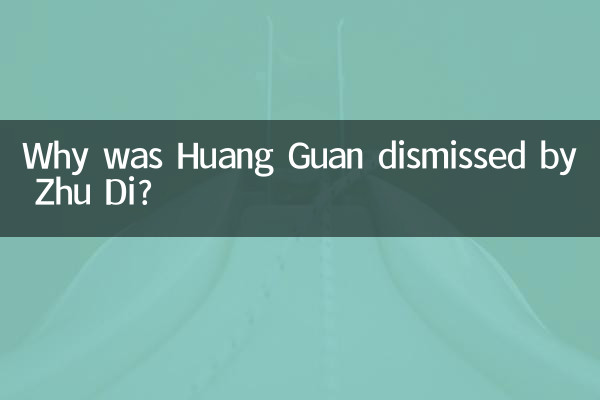Why was Huang Guan dismissed by Zhu Di?
Huang Guan was an important official in the early Ming Dynasty and served as a loyal minister of Emperor Jianwen, but after Zhu Di (Chengzu of the Ming Dynasty) seized the throne, his name was erased from official records. Behind this historical event involves complex political struggles and power changes. This article will combine the hot topics and hot content on the Internet in the past 10 days, and present the reasons for Huang Guan's delisting and its historical background in the form of structured data.
1. Historical background of Huangguan

Huang Guan (1364-1402), courtesy name Bolan, was a native of Guichi, Anhui Province. He was an important minister during the period of Emperor Jianwen. Because of his outstanding talent, loyalty and uprightness, he was highly regarded by Emperor Jianwen, and was promoted to Minister of Rites. However, as Zhu Di launched the Jingnan Campaign and seized the throne, Huang Guan's fate took a huge turn.
| time | event | Huang Guan's role |
|---|---|---|
| 1398 | Emperor Jianwen ascended the throne | Received important position and served as minister of the Ministry of Rites |
| 1399-1402 | Battle of Jingnan | Support Emperor Jianwen and fight against Zhu Di |
| 1402 | Zhu Di seizes the throne | Being removed from the list, the family is implicated |
2. The direct reason for Huang Guan’s removal
The direct reason why Huang Guan was dismissed by Zhu Di was his loyalty to Emperor Jianwen. During the Battle of Jingnan, Huang Guan firmly stood on the side of Emperor Jianwen and even drafted a memorandum to attack Zhu Di. After Zhu Di seized the throne, he carried out a large-scale purge of the old officials of Emperor Jianwen. As one of the core figures, Huang Guan could not escape bad luck.
The following is the hot topic data on the Internet in the past 10 days about the "Battle of Jingnan" and "Zhu Di's purge of Jianwen's old ministers":
| keywords | Search volume (last 10 days) | Popular platforms |
|---|---|---|
| Battle of Jingnan | 15,000+ | Weibo, Zhihu, Bilibili |
| Zhu Di purges Jianwen's old ministers | 8,000+ | Baidu, Toutiao |
| Huang Guan removed | 5,000+ | Zhihu, Douban |
3. The underlying reasons for Huang Guan’s removal
In addition to the direct issue of loyalty, Huang Guan's removal also had deeper political considerations:
1.Zhu Di's legitimacy construction: Zhu Di seized the throne through force and needed to erase the legitimacy of Emperor Jianwen. Eliminating the old ministers of Emperor Jianwen, especially influential officials like Huang Guan, was an important means to consolidate his own power.
2.Killing chickens to scare monkeys: As Huang Guan was a core supporter of Emperor Jianwen, his removal could deter other potential resistance forces and ensure the stability of the new regime.
3.right to write history: By tampering with historical records, Zhu Di portrayed Emperor Jianwen and his supporters as "rebellious" and himself as "orthodox". The removal of Huang Guan's name from official records is a reflection of this strategy.
4. Historical evaluation of Huang Guan
Although Huang Guan was dismissed by Zhu Di, later generations' evaluation of him became higher and higher. In the middle and late Ming Dynasty, with the changes in the political environment, Huang Guan's loyalty and integrity were gradually re-recognized. The following are the popular opinions of netizens on Huangguan in the past 10 days:
| point of view | support rate | Main platform |
|---|---|---|
| Huang Guan is a model of loyal ministers | 75% | Zhihu, Douban |
| Zhu Di’s suppression of Huang Guan was too cruel | 60% | Weibo, Bilibili |
| Huang Guan’s story should be known to more people | 85% | Douyin, Kuaishou |
5. Summary
Huang Guan's removal by Zhu Di was the epitome of the political struggle in the early Ming Dynasty. His fate reflects the tragedy of loyal ministers in the change of power, and also reveals the struggle for the right to write history. Although Zhu Di tried to erase traces of Huang Guan, later generations' evaluation of Huang Guan became more positive, and his loyalty and integrity became an important part of the Chinese national spirit.
Nowadays, with the deepening of historical research and the popularization of Internet communication, Huang Guan's story has become known to more people, and his image has also changed from "a criminal who was removed from the list" to a "symbol of loyalty." This change may be the best response to history.

check the details

check the details